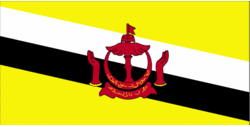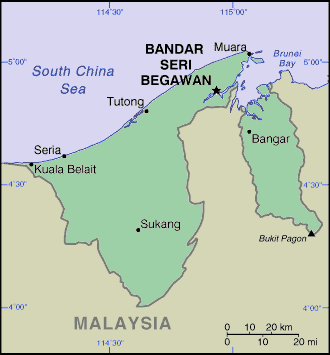Traveling Luck for Brunei. Brunei, Asia
Brunei is located in Southeastern Asia, bordering the South China Sea and Malaysia.
Land in Brunei is flat coastal plain rises to mountains in east; hilly lowland in west.
Bruneian land covers an area of 5770 square kilometers which is slightly smaller than Delaware
Brunei has borders with Malaysia for 381km.
 Bruneian national flag (Flag of Brunei)
Bruneian national flag (Flag of Brunei)
As for the Bruneian climate; tropical; hot, humid, rainy.
Bruneian(s) speak Malay (official), English, Chinese.
Places of note in Brunei
 Bruneian map
Bruneian map
Regions of Brunei
The Sultanate of Brunei's influence peaked between the 15th and 17th centuries when its control extended over coastal areas of northwest Borneo and the southern Philippines. Brunei subsequently entered a period of decline brought on by internal strife over royal succession, colonial expansion of European powers, and piracy. In 1888, Brunei became a British protectorate; independence was achieved in 1984. The same family has ruled Brunei for over six centuries. Brunei benefits from extensive petroleum and natural gas fields, the source of one of the highest per capita GDPs in the developing world.
This small, well-to-do economy encompasses a mixture of foreign and domestic entrepreneurship, government regulation, welfare measures, and village tradition. Crude oil and natural gas production account for nearly half of GDP and more than 90% of government revenues. Per capita GDP is far above most other Third World countries, and substantial income from overseas investment supplements income from domestic production. The government provides for all medical services and free education through the university level and subsidizes rice and housing. Brunei's leaders are concerned that steadily increased integration in the world economy will undermine internal social cohesion, although it became a more prominent player by serving as chairman for the 2000 APEC (Asian Pacific Economic Cooperation) forum. Plans for the future include upgrading the labor force, reducing unemployment, strengthening the banking and tourist sectors, and, in general, further widening the economic base beyond oil and gas.
Bruneian natural resources include petroleum, natural gas, timber
close to vital sea lanes through South China Sea linking Indian and Pacific Oceans; two parts physically separated by Malaysia; almost an enclave within Malaysia
Bruneian religion is Muslim (official) 67%, Buddhist 13%, Christian 10%, indigenous beliefs and other 10%.
Natural hazards in Brunei include typhoons, earthquakes, and severe flooding are rare.
Travel Advice for Brunei
BruneiSUMMARY
- You should not become involved with drugs of any kind: possession of even very small quantities can lead to imprisonment or the death penalty.
- The threat from terrorism is low. But you should be aware of the risk of the global risk of indiscriminate terrorist attacks which could be against civilian targets, including places frequented by foreigners.
- If you plan to travel to the Malaysian State of Sabah, you should be aware that we believe terrorists and criminal elements are continuing with plans to kidnap foreign tourists from the islands and coastal areas of Eastern Sabah. Boats travelling to and from offshore islands and dive sites are possible targets. Action taken by the Philippine Armed Forces in January 2007 against terrorist groups in the southern Philippines may heighten this risk. If you wish to visit resorts on, and islands off, Eastern Sabah, you should exercise extreme caution.
- Around 10,000 British nationals visit Brunei each year. Most visits are trouble-free. The majority of incidents for which British nationals require consular assistance involve replacing lost passports or travellers hospitalised with medical conditions.
- We strongly recommend that you obtain comprehensive travel and medical insurance before travelling. You should check any exclusions, and that your policy covers you for the activities you want to undertake. Please see: Travel Insurance.
SAFETY AND SECURITY
The threat from terrorism is low. But you should be aware of the global risk of indiscriminate terrorist attacks, which could be aimed against civilian targets, including places frequented by foreigners. There have been serious attacks in other parts of South East Asia. In neighbouring Indonesia, Westerners were deliberately targeted in terrorist attacks in Bali (October 2002) and Jakarta (August 2003 and September 2004).
If you plan to travel to the Malaysian State of Sabah, you should be aware that we believe terrorists and criminal elements are continuing with plans to kidnap foreign tourists from the islands and coastal areas of Eastern Sabah. Boats travelling to and from offshore islands and dive sites are possible targets. Action taken by the Philippine Armed Forces in January 2007 against terrorist groups in the southern Philippines may heighten this risk. If you wish to visit resorts on, and islands off, Eastern Sabah, you should exercise extreme caution.
Please read Security and General Tips and Risk of Terrorism when Travelling Overseas for further information and advice.
Crime
Crime levels are low in Brunei, but there are occasional incidents of petty crime against tourists. You should:
- take particular care of your passport;
- when going out avoid carrying valuables with you;
- not leave possessions in unattended vehicles, even if out of sight in a locked boot.
Brunei Country Profile.
Road Safety
If you are involved in a road accident as a driver, you should not leave the scene until the police have attended.
A foreign driving licence can be used in Brunei as long as it is endorsed by the Brunei Land Transport Department in the Ministry of Communications. Alternatively you may use an International Driving Licence.
Trekking
It is easy to get lost when visiting the rainforest. You should use recognised and well-known guides, and be sure to stay on the footpaths.
LOCAL LAWS AND CUSTOMS
Possession of pornographic material is illegal.
Homosexual activity is illegal.
Any public criticism of His Majesty The Sultan or other members of the Bruneian Royal Family is strongly discouraged.
There are severe penalties for all drug offences in Brunei including, in some cases, the death penalty. The legal system in Brunei is partly based on Sharia law and can, in certain circumstances, apply to non-Muslims including visitors.
The sale of alcohol in Brunei is prohibited. Non-Muslims may import duty free, two bottles of wine or spirits and twelve cans of beer on every entry into Brunei, but must declare them to Customs on arrival. Keep the Customs slip in case of inspection.
ENTRY REQUIREMENTS
HEALTH
The standards of healthcare in Brunei are generally better than in many countries in the region, though basic hospital supplies can run low from time to time. There is only one significant medical facility: the Government General Hospital (RIPAS) in Bandar Seri Begawan. Should complications arise, medical evacuation to Singapore is necessary. Good dental care can be found either at Jerudong Park Medical Centre or from local private dentists. Most branded pharmaceuticals are also readily available, including condoms.
You should seek medical advice before travelling and ensure that all appropriate vaccinations are up to date, particularly if travelling elsewhere in the region. For further information on health, check the Department of Health’s website at: www.dh.gov.uk
GENERAL
Money
Credit cards are accepted at most major establishments. Travellers’ cheques can be cashed at banks or major hotels. Singapore Dollars may also be used in Brunei and are of the same value as the Brunei Dollar. Most other major currencies are convertible at banks, hotels or official moneychangers.
Departure Tax
A Departure Tax of 12 Brunei Dollars (about £4) is payable for most departing passengers from Brunei. This is payable in local currency, in cash, at the airport check-in desk.
Registration
If you plan to stay for an extended period in Brunei you are strongly advised to register with the British High Commission in Bandar Seri Begawan upon arrival. This can be done electronically via the High Commission website (see below).

 Search
Search Brunei country profile
Brunei country profile Travel advice for Brunei
Travel advice for Brunei